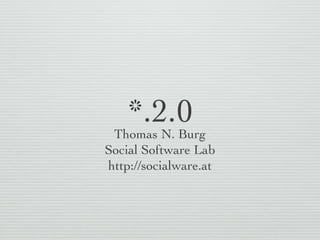2.0 again
- 1. *.2.0 Thomas N. Burg Social Software Lab http://socialware.at
- 2. The web as the platform How people can interact to make something that‘s greater that the sum of its parts. (©T.Coates)
- 3. the middleman Using software to enhance our social and collaborative abilities through structured mediation
- 4. Object-centered sociality Soziale Netzwerke werden auch durch Objekte vermittelt. Job, Termin, Urlaub, Hobby, Themen, Personen, Orte, Fotos, ... Interaktion ist dadurch aber nicht determiniert
- 5. Individual Group Data Augmented Social Intelligence I comp. D. Engelbart & Lee Bryant Personal Tools that mediate the access between
- 6. Conversation Visibility Augmented Social Intelligence II Facilitation Knowledge Trust Social Capital
- 7. NEXTspace
- 10. Platform Emergent Network-centric Creation Users Distributed Collaboration Cumulative
- 11. John Hagel
- 12. Sebastian Fiedler [...] I yet have to hear a story about a young professional who felt the terrible need to install and run his own LMS platfrom to support his or her personal change project. But I know loads who use an array of small, simple and (increasingly networked) personal tools to their advantage. And guess what? It is usually a pretty messy sight... no integrated interfaces, no single-sign-on mechanisms, no careful workflow management. [...] Technologies of Cooperation http://Seblogging.cognitivearchitects.com/2006/08/23#a1785
- 13. Klassische Dichotomie wobei „Distributed“ nicht notwendigerweise heisst, dass es kein zentrales Service dafür gibt.
- 15. Erfolgreiche Social Software Wert für die anderen. Wert für den Anbieter Persönlicher Wert
- 16. Persönlicher Wert Linksammlung Personalisierung/Empfehlung (last.fm) Doksammlung Fotos/Video/PDFs/... Reputation Publizieren/Sichtbarmachen Auffindbarkeit/ PKM
- 17. Kollektiver Wert Soziale Objekte Links Text Video Foto Music Events
- 18. Organisationaler Wert Services um die Daten Geschäftsmodelle um die Daten Ökosysteme für weitere Datennutzung Daten
- 19. Rollen und Rewards Arbeiter Entdecker Kommunikatoren Defätisten ©Richard A. Bartle Anerkennung Spiel Austausch/Beziehungen Macht acting interacting Metrics (indirect rewards) via Lots of Metadata
- 20. Creativity & Innovation in Networks Diverse Stimuli Serendipity Autonomy No-preconceptions Principle Rich Information Provision
- 21. Facilitation Gardening Design for Evolution Dialogue In/Outside Diff Levels of Participataion Public and Private Spaces Focus on Value Familiarity and Excitement Create a Rhythm ©Wenger
- 22. Modell Konsens-Modell (Wikipedia) klare, kommunizer-bare Mission strenge Regeln Altruismus Gärtner Schwer reproduzierbar Emergenz-Modell (Flickr) reproduzierbar unterschiedliche Lebenszyklen Parallele, beliebige Communities keine übergeordnete Mission hoher indiv. Nutzen ©T.Coates
- 23. Groupforming ©Wenger&Snyder Enterprise Social Software supports
- 24. Stand der Dinge Learning objects (course + delivery) LMS Modules Quizzes Tests Discussions Grading Integration Informations System Distance or Blended Learning Instructor
- 25. Trends (...platform) Demografie Cluetrain Manifesto conversation prosumer Learner/User-centered design (Wer hat Kontrolle?) Disintermediation (firms, government, education) Aggregate & Remix Connectivism vs. Constructivism (es geht nicht um Fakten, sondern um das Navigieren in dynamischen Systemen) WWW: Distribution => Communication (Read-Write-Web [W2.0])
- 26. Tools Wiki Weblog Podcast IM openBC del.icio.us Flickr YouTube
- 27. Stephen Downes „ ... It's about enabling and encouraging participation through open applications and services. By open I mean technically open with appropriate APIs but also, more importantly, socially open, with rights granted to use the content in new and exciting contexts.“
- 28. E-Learning 2.0 Role model: Etienne Wenger‘s „Communities Of Practice“ "a shared domain of interest" where "members interact and learn together" and "develop a shared repertoire of resources." Learning is created/syndicated vs. delivered and consumed Beyond the task/course Networks across institutions E-Portfolio Workflow Learning
- 29. Jay Cross E-Learning Workflow Learning (Sam Adkins) Informal Learning http://informl.com/
- 30. Formal Learning Non-formal Learning Informal Learning Conversation Curriculum-driven Self-directed Learning Situated Learning Negotiated Curriculum

